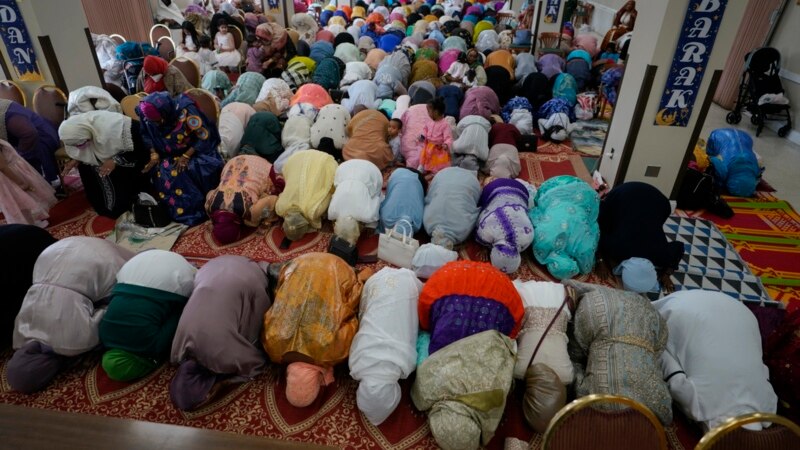This website uses cookies so that we can provide you with the best user experience possible. Cookie information is stored in your browser and performs functions such as recognising you when you return to our website and helping our team to understand which sections of the website you find most interesting and useful.
 WASHINGTON —
WASHINGTON —
The Islamic holiday of Ramadan is being observed this year as the Israel-Hamas war surges in Gaza, where the United Nations is warning of a growing humanitarian crisis.
Imam Talib Shareef of Masjid Muhammad, the Nation’s Mosque, in Washington said there will be differences in how Muslims observe this year because of the conflict.
Other than organizing prayers for the community, the mosque is "more engaged in service and feeding; we actually feed at the masjid and [also at] shelters, and we also go to other faith communities," said Shareef, who served for more than 30 years in the U.S. Air Force and helped to establish the first Islamic military chaplain in 1993.
"I do expect that … religious communities are going to be trying to come together," he said, noting that his mosque also works with churches and gives food to others in the community.
"Obviously [the conflict] is going to be on people's hearts, on people's souls, it's bothering people," Shareef said.
Nearly 2 billion Muslims around the world will begin observing the Islamic holiday Ramadan, which is expected to begin on March 10 or 11, depending on the sighting of the moon.
During the month of Ramadan, Muslims abstain from food, drink, smoking, gossip and sexual relations from sunrise to sunset. Fasting is meant to bring Muslims closer to God and help them better empathize with those who are less fortunate.
US Muslims
In the United States, the Muslim population is about 3.45 million, which accounts for slightly more than 1% of the population, according to Pew Research.
Depending on where Muslims live in the United States, their experience can vary. In some rural areas, Muslims may not have access to a mosque or a community where they can practice their faith.
This is particularly true for immigrants who move to areas without a large Muslim population.
Jemal Yasin, who immigrated to the U.S. from Ethiopia in 2008 to do postgraduate research at the University of Vermont, described his first experience in the United States as "a little bit lonely."
He said there was a community of Somali immigrants, though he didn’t get a chance to pray with them.
During that first year in the States, he said he had to "pray in my room by myself," which he said was a typical experience of many Muslim immigrants.
Now, Yasin is president of the board of directors of a the First Hijrah Foundation in Washington.
The FHF started as a small organization that aimed to "promote and preserve the Islamic heritage," and "foster the Islamic principles of brotherhood, equality, mutual assistance and teachings of peace, love and justice," according to its website.
Initially, the organization didn't have a building, and members of the foundation would meet at one another's houses. It wasn't until 2005 that their current building was officially secured, said Yasin.
"This is a center for Muslims, all Muslims. … So, when you come here, you see [people of many] backgrounds – African Americans, Ethiopians, Somalians, Arabs – they will come pray together and break fast together, so this is a place for everybody," Yasin said.
He added that the foundation works with the community and organizes events for Muslims, before, during and after Ramadan.
When he moved to Washington later in 2008 Yasin became involved with the foundation and was able to be part of a larger Muslim community.
Ramadan observations are becoming more common in the United States, with many organizations hosting events to observe the month.
Shareef said, "We used to have more … private iftars in the past, and now they're more open … and we are able to share more."
After sunset, Muslims typically gather for iftar — the breaking of the fast and the most important meal of the day.
Yasin said the foundation helped organize a bazaar on Sunday to help the community prepare for Ramadan. Traditional clothing, incense and foods, such as dates, were sold.
During Ramadan, the First Hijrah Foundation will be providing free iftars for the community each night.
Ramadan this year
The ongoing Israel-Hamas war is the result of an October 7 terror attack in which Hamas crossed into Israel, killing more than 1,200 people and taking more than 240 civilians hostage. The Israeli military response has killed more than 30,000 Palestinians, according to Gaza's health ministry.
Negotiators are pushing for a possible cease-fire in the Israel-Hamas conflict ahead of the start of Ramadan.



 Africana55 Radio
Africana55 Radio 

